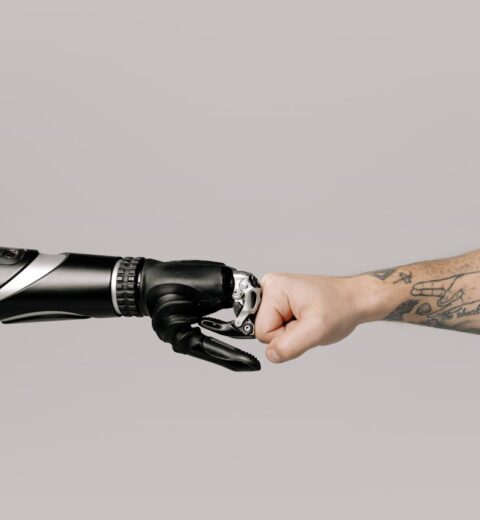Recruitment has always been about connecting people with the right opportunity. But in this digital age, we find ourselves at a crossroads. Technology is evolving, and so is the way we hire. AI is transforming recruitment into a process of speed, precision, and insight. But here’s the question: Will AI eventually replace human recruiters? Or is there a future where both collaborate in harmony?
Key Takeaways:
- The future of recruitment is a partnership between AI and human expertise. AI will handle tasks like data analysis and automation, but humans will remain essential for judgment and cultural fit.
- AI tools like Applicant Tracking Systems (ATS) and Pymetrics streamline hiring processes by analyzing data, allowing recruiters to focus on higher-level decision-making.
- AI helps drive diversity and inclusion in recruitment by reducing unconscious bias and focusing on skills and merit over demographic factors.
- Ethical concerns, like bias in AI algorithms and data privacy, need to be addressed for AI to be a truly fair and transparent tool in recruitment.
What Role Does AI Play in Recruitment?
AI in recruitment is like a finely tuned instrument in the orchestra of hiring. It’s here to automate tedious tasks like scanning resumes, scheduling interviews, and analyzing large volumes of data. But it doesn’t stop there. Tools, like Applicant Tracking Systems (ATS), offer deep insights into candidate profiles, predicting which applicants are more likely to succeed in a role. It makes recruitment faster, more efficient, and, frankly, more data-driven.
AI is not a trend, but an inevitable shift in how recruitment will work. Tools like Pymetrics and HireVue are already proving this point, using AI to assess candidates through cognitive games and video interviews. You’d be surprised how AI can uncover hidden patterns in data that might elude even the most experienced recruiter.
Also read on: The Ultimate Guide to IT Recruitment for Startups
The Human Element in Recruitment: Why It’s Still Important
Let’s slow down for a moment. While AI is a powerful tool, it doesn’t have what makes recruitment truly special: human intuition. Recruitment is about more than just qualifications, it’s about understanding a candidate’s personality, culture fit, and potential to thrive within a specific team. These are the things that AI can never fully grasp.
Humans bring empathy, emotional intelligence, and a personal touch. These are the very qualities that allow us to make nuanced decisions that go beyond just data. A recruiter’s ability to gauge whether a candidate will mesh with the team’s dynamics or share the company’s values cannot—and should not—be replaced by AI.
AI vs. Human Recruitment: A Partnership or Competition?
Now, here’s where I challenge you to think. It’s not about AI replacing humans, it’s about AI enhancing humans. AI can handle all the repetitive tasks, the data processing, the number crunching, while the human recruiter can focus on what matters most: making the final, intuitive call about a candidate’s fit.

As Sam Altman, OpenAI’s CEO, recently pointed out, Gen Z and Millennials are already seeing AI as a trusted adviser, not just a tool. This isn’t just about automating the hiring process, it’s about leveraging AI as a strategic partner in decision-making, just as younger generations now use AI tools like ChatGPT for personal guidance (Fortune).
Also read on Expert IT Recruitment & Tech Staffing – Hire Skilled IT Professionals
How AI Recruitment Tools Are Shaping the Future of Hiring
AI-driven recruitment tools like HireVue and Pymetrics are already making waves in recruitment by analyzing video interviews and using neuroscience-based games to assess emotional intelligence. These technologies allow recruiters to focus on high-level decisions by providing them with data insights that would otherwise take hours to extract manually.
But what’s even more intriguing is how AI is helping to create diverse, inclusive teams. By removing unconscious bias from the decision-making process, AI ensures that hiring decisions are based solely on skills and merit, leading to more balanced and inclusive work environments.
Challenges and Ethical Considerations in AI Recruitment
Let’s face it: AI isn’t perfect. It brings with it some important ethical concerns. Bias is one of the most significant risks when it comes to AI recruitment. If AI systems are trained on biased data whether intentional or not, they will continue to perpetuate these biases, leading to unfair hiring practices.
Then there’s the issue of data privacy. With AI handling sensitive candidate information, companies must be transparent and responsible in how they manage and protect this data. Maintaining trust with candidates is key, and without solid ethical standards, AI could cause more harm than good.
The Future of Recruitment: Will It Be AI, Human, or Both?
Looking ahead, the future of recruitment doesn’t hinge on whether AI or humans will prevail; it’s about how they work together. As AI continues to handle the heavy lifting, human recruiters will step in where their judgment, intuition, and emotional intelligence are needed most.
Sam Altman’s recent comments about AI being used as a life adviser reflect a broader trend: we’re increasingly relying on AI for guidance in not only our personal lives but in the professional realm too. This collaboration between AI and human decision-making will only grow stronger in recruitment, creating a future where the process is smarter, faster, and more humane.
Conclusion: Embracing the Future of Recruitment
So, here’s the bottom line, the future of recruitment is about AI and humans working in harmony, not about one replacing the other. AI’s ability to automate, analyze, and streamline makes it indispensable in the hiring process, while human recruiters will continue to provide the insight, empathy, and judgment that AI simply can’t replicate.
Together, we will forge a future where recruitment is more efficient, more inclusive, and ultimately, more effective in connecting the right talent with the right opportunities.
FAQ
- Will AI replace human recruiters in the future?
- Not at all. AI will automate repetitive tasks, but human recruiters will always be needed for their empathy, judgement, and final decision-making.
- Not at all. AI will automate repetitive tasks, but human recruiters will always be needed for their empathy, judgement, and final decision-making.
- How does AI improve the recruitment process?
- AI accelerates recruitment by handling tasks like resume screening, data analysis, and interview scheduling, allowing human recruiters to focus on higher-level decisions.
- AI accelerates recruitment by handling tasks like resume screening, data analysis, and interview scheduling, allowing human recruiters to focus on higher-level decisions.
- What are the ethical concerns with AI in recruitment?
- AI can perpetuate biases if trained on flawed data. It also raises concerns about the privacy and protection of sensitive candidate information.
- AI can perpetuate biases if trained on flawed data. It also raises concerns about the privacy and protection of sensitive candidate information.
- Can AI help with diversity and inclusion in recruitment?
- Yes. By reducing unconscious bias, AI helps ensure hiring decisions are based on skills and abilities, fostering diversity in the workplace.
- Yes. By reducing unconscious bias, AI helps ensure hiring decisions are based on skills and abilities, fostering diversity in the workplace.




